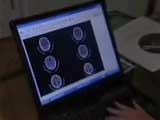|
Sorry I was gone for a day. Having exhibited an alarming tendency to stop posting, for weeks at a time, I know any lapse is automatically a possible harbinger of another gap. You don't like to see an alcoholic reaching for that 1st glass of wine :)
 Yesterday I had the pleasure of reuniting with a group of ex-colleagues from my days at Intuit, aka "the Elroy team". (All projects and products of this team were code-named after Jetson's characters.) This group was actually a separate company half-owned by Intuit and half-owned by a consortium of VCs, charged with building "Web Quicken" in the wild dot-com days of 1998. Ah, the stories that could be told... Anyway it was really cool seeing everyone. People really don't change. And even the people you didn't particularly like at the time are wonderful to see seven years later :) Yesterday I had the pleasure of reuniting with a group of ex-colleagues from my days at Intuit, aka "the Elroy team". (All projects and products of this team were code-named after Jetson's characters.) This group was actually a separate company half-owned by Intuit and half-owned by a consortium of VCs, charged with building "Web Quicken" in the wild dot-com days of 1998. Ah, the stories that could be told... Anyway it was really cool seeing everyone. People really don't change. And even the people you didn't particularly like at the time are wonderful to see seven years later :) 
Bill Whittle has posted a new essay, Sanctuary, which means you have to read it. Go ahead. 
Jeff Jacoby: Why Islam is disrespected. "Yes, Islam is disrespected. That will only change when throngs of passionate Muslims show up for rallies against terrorism, and when rabble-rousers trying to gin up a riot over a defiled Koran can't get the time of day." 100% right. 
The Economist reports on stem cell progress in South Korea. "Unlike many Americans, up to and including the president, Korean scientists - and the authorities that support them - do not wring their hands in agony about experimenting on tiny clusters of cells that might, in other circumstances, grow into people. They just get on with it." This is one of many areas where I totally disagree with President Bush. Good thing California has a $3B stem cell initiative of our own - hopefully the Federal government will stay out of our way. As if. 
 Esther Dyson talks with innovators about Personal Health Records (link to page with movie). "Is a complete electronic record of your medical history available to you or your doctors? Chances are, it isn't. At least not yet." A key aspect of having a full online record for each patient is capturing Pathology information, which requires digitizing microscope slides. Which requires a ScanScope! Esther Dyson talks with innovators about Personal Health Records (link to page with movie). "Is a complete electronic record of your medical history available to you or your doctors? Chances are, it isn't. At least not yet." A key aspect of having a full online record for each patient is capturing Pathology information, which requires digitizing microscope slides. Which requires a ScanScope! 
Joel Spolsky: Wall Street survival 101. "Never, ever, ever buy bonds at retail from a full-service broker. Especially municipal bonds." Okay. 
Bittorrent goes "trackerless". Wow, there goes the neighborhood, if it hadn't gone already. I downloaded Star Wars Episode III last night, just to see if I could do it (I do want to see the movie in a theater, first). There were so many seeds active the download only took about 45 minutes, for a 1.4GB file. The MPAA is going to have a tough time putting this genie back in the bottle. 
The popularity of "stuff" in a market area seems to follow a power-law distribution. Clay Shirkey had done some interesting analysis of power laws, which Chris Anderson summarizes in a power-law primer. "Powerlaw distributions occur where things are different, some are better than others, and network effects can work to promote the good and suppress the bad." Like movies :) 
Clive Thompson wonders: How ugly will you be in high-def? Don't ask. 
Robert X. Cringley follows up on his inflection point article with another, on creating the future. I sure hope he's right about Apple's plans for an online video service. How silly is it that the MPAA are fighting online distribution, instead of leading it? I guess they didn't learn as much from the RIAA as we'd hoped... 
Google's input line has so much power, it is basically a command-line interface to the web. Jeff Atwood reviews Google-fu. And since it is available as an HTTP interface, it is already available as a web service for any program which wants it. The new OS? Well, yeah, kind of... 
 Finally, here we have the Kitten cannon. [ via Kehaar ] I don't know that I should be proud or embarrassed that my record is 451'. Finally, here we have the Kitten cannon. [ via Kehaar ] I don't know that I should be proud or embarrassed that my record is 451'. 
| 



